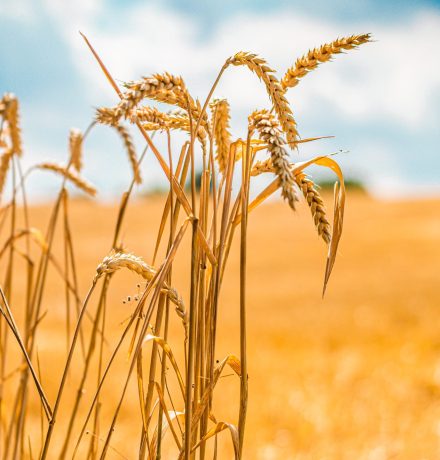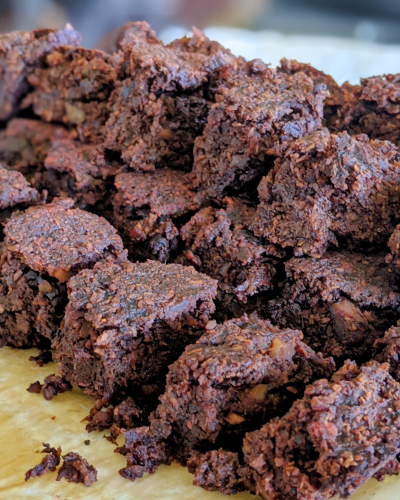Does Gluten affect gut health?

Is gluten the cause of your gut health problems?
In recent years, we’ve seen increasing problems with gluten intolerance with symptoms of bloating, leaky gut, IBS and weight gain, and autoimmune conditions celiac disease that prevent gluten consumption altogether. But is gluten to blame, or is it a process known as “Hybridisation?"

In a recent article USDA (2020) reports that the “hybridised wheat industry” is booming and explains that “hybridisation is the cross-breeding of two genetically different varieties or species.” Essentially it means that wheat grows faster and shorter, making it quicker to harvest whilst yielding higher crops. Whilst this is good for the farmer and meets increasing demands, is this good for gut health?
Research shows hybridised wheat may not be so good for gut health.
A study by Lorgeril & Salen (2014) published in the International Journal of Food Sciences and Nutrition reports that gut health problems including bloating, leaky gut, IBS, weight gain and celiac disease, have been on the rise since the introduction of wheat hybrids.
Lorgeril & Salen (2014) go on to say that hybridisation techniques have made their way into the food chain without animal or human safety testing and recommend that medical studies are carried out to access potential long-term health implications of consumption hybridised wheat. This alarming news could mean gluten from hybridised wheat is to blame for bloating, leaky gut, IBS, weight gain, celiac disease, and other gut health problems.

Knowing this, what can you do to improve your gut health?
- Avoid the following gluten grains: wheat; wheat bran; cracked wheat; couscous; semolina; rye; barley; bulgur; spelt; triticale; Kamut and farro.
- Avoid the following gluten foods: bread, baked goods, pizza, pasta, fast food, pies, cakes, biscuits, cookies, muffins, crackers, junk food, takeaways, fast-foods, seasonings, soy sauce, condiments, spice mixes, processed foods.
What gluten-free grains are recommended for gut health?
Amaranth, buckwheat, quinoa, gluten-free oats, millet, brown rice, black rice, red rice, wild rice, sorghum, teff, corn, tapioca and arrowroot.
Heavenly Vegan & Gluten Free chocolate brownies
Beetroot & Raspberry Brownies (vegan & gluten free)
Enjoy this tasty treat for a snack any time of day! Serves: 18-24 slices, Prep: 15 mins, Baking: 40 mins
Ingredients
- 1 cup almond meal
- ½ cup brazil nuts (chopped or blender pulsed into small pieces)
- ½ cup walnuts (chopped or blender pulsed into small pieces)
- 2 tbsp. cacao powder
- 1 ½ tsp bicarb soda
- ¾ cup shredded coconut
- 1 tsp Celtic or Himalayan sea salt
- 125g 85% dark chocolate (chopped in small pieces)
- 250g beetroot, chopped, cooked & grated
- 150g raspberries
- 4 tbsp. rice syrup
Method
- Cook chopped beetroot, strain, grate and set to one side.
- Grease and line with baking paper a 35 x 25cm x 3cm baking tin.
- Preheat fan-forced oven to 180 degrees centigrade.
- Place all dry ingredients into a large bowl, mix well.
- Add remaining ingredients and mix well.
- Place the mix in the baking tray, pat down evenly.
- Bake for 40 mins at 180 degrees centigrade.
- Remove from oven, insert a knife in the centre, ensure it comes out clean; if not, bake for another 5 mins.
- Remove from the oven and allow to cool.
- Cut brownies and serve with coconut yogurt/coconut ice cream or your favourite tea.
- Store in the fridge for 5-7 days and in the freezer for three mont

If you would like to learn more about looking after your gut health, book in for your Free 15-minute gut health discovery call with Amanda Wright, the Gut Health Specialist Now!
References:
USDA National Institute of food and agriculture. (2020). Hybridised wheat: seven years in the making. Retrieved from https://nifa.usda.gov/announcement/hybridized-wheat
Lorgeril, M.D. & Salen, P. (2014). Gluten and wheat intolerance today: are modern wheat strains involved? International Journal of Food Sciences and Nutrition, 65(5), 577-581. https://doi.org/10.3109/09637486.2014.886185
